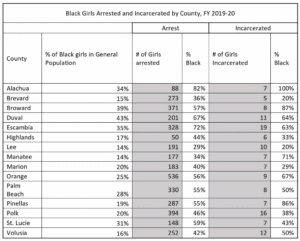High rates of disproportionate arrests and lockups in nearly one-fourth of Florida counties

Although Black girls account for just 21% of the girl population in Florida, they are more than two times overrepresented in:
- Out-of-school suspensions for girls (49%)
- Incidents involving girls and law enforcement in schools eligible for civil citation (49%)
- Arrests of girls (45%); arrests of girls under 12 and younger (55%)
- Probation of girls (52%)
- Incarceration of girls (47%)
- Girls’ transferred/charged into the adult criminal justice system (51%)
Schools remain primary gateway for juvenile justice involvement
According to DJJ data, officers arrested more than 3,000 Black girls in schools and their communities in 2019-20. The youngest Black girl arrested was just six years old. Of the 524 girls arrested who were 12 years old and younger, Black girls represented 55%. In the community, 1,292 Black girls were eligible for an alternative to arrest (e.g. civil citation) but 43% were still arrested. In addition, justice system officials placed over 850 Black girls on juvenile probation, incarcerated 101 (14 for a technical violation of probation as their most serious offense) and transferred 19 Black girls to the adult system in Florida.
“While the disparate discipline rates among girls are troubling, what’s equally disturbing is the lack of awareness of how historical trauma and racial bias impact our day-to-day interactions with girls of color. Black girls do not misbehave more than their white peers, but their behaviors are responded to much more harshly,” stated Vicky Basra, President/CEO of the Delores Barr Weaver Policy Center.
The report confirms that schools are a primary gateway for pushing Black girls into the juvenile justice system. Preliminary data analysis by the Policy Center showed that due to the school closure, the number of contacts with law enforcement decreased. Specifically in April–June 2020, there were only 6 contacts, in comparison to 250 contacts during the same prior period.
According to Roy Miller, president of American Children’s Campaign, “As children return back to school in larger numbers, American Children’s Campaign and child advocates throughout Florida are deeply concerned that the disproportionate arrests and discipline of Black girls will begin to soar again.”
The report, Sounding the Alarm: Criminalization of Black Girls in Florida, is released in collaboration with American Children’s Campaign as part of the Justice for Girls Movement.
The Sounding the Alarm brief brings together research on critical areas that warrant attention and provides recommendations to address the mechanisms and policies creating disparate and harmful experiences for young Black girls in Florida.
Researchers analyzed both national and state data including statistics from the U.S. Department of Education Office of Civil Rights, Florida Department of Education, Florida Department of Juvenile Justice, as well as the Florida Department of Health Youth Substance Abuse Survey and Youth Risk Behavior Survey.
Deep disparity among Florida counties
There are stark geographical imbalances regarding the response to Black girls. Fifteen counties had particularly high overrepresentation of Black girls in juvenile arrests and incarceration: Ten counties arrested more than ten Black girls under the age of 12.

Source: Authors’ analysis of Florida Department of Juvenile Justice Delinquency Dashboard, January 2021
Recommendations for immediate action
Several recommendations were presented in the report:
- Enact policies that ban suspension of Pre-K-3 grade students and set limits on arrests for youth under the age of 12 (with some exceptions based on severity of offense), further delineate the roles of schools, school resource officers and law enforcement.
- Community leaders, policymakers, and school districts need to examine educational disparity, discipline and juvenile justice trends specific to Black girls, as well as school district suspension data, and engage girls in the community response by conducting focus groups.
- Fund increased school mental health services that are girl-centered, trauma-informed and culturally responsive.
- Increase the utilization of juvenile civil citations as alternatives to arrest in schools and the community. Fund therapeutic alternatives to families in crisis outside of the juvenile justice system.
- Identify and implement best practices and solutions from states and jurisdictions that are deliberately responding to systemic disparities that Black girls face in the justice system
“The disproportionate trends among Black girls entering the system at young ages equips community leaders to bring about long overdue changes that will immediately change the trajectory of Black girls and their families,” stated Vanessa Patino Lydia, Ph.D., vice president of research and planning, Delores Barr Weaver Policy Center.
Nationally known contributor, author, CEO of the Institute for Women’s Policy Research (Washington, D.C.) and Delores Barr Weaver Policy Center Board Vice- Chair, Dr. C. Nicole Mason adds, “This research reveals the harsh realities Black girls face when it comes to educational, justice, and societal systems that often fail them. It is our responsibility as a society to advocate for them. Every girl deserves to be safe in this world. Every girl deserves to the chance to realize her full potential without being wrongfully penalized for her race, gender, or socio-economic status. The information presented here should spur each of us to action. It’s not enough to feel bad about what you’ve read. It’s time to act”
A copy of the Sounding the Alarm report can be accessed here.
About Delores Barr Weaver Policy Center
Established in 2013, the Delores Barr Weaver Policy Center, a not-for-profit 501 (c) 3 is the outgrowth of the Justice for Girls Movement. The mission is to engage communities, organizations, and individuals through quality research, advocacy, training and model programming to advance the rights of girls and young women and youth who identify as female, especially those impacted by the justice system.
About American Children’s Campaign
Founded in 1992, American Children’s Campaign is a non-partisan, nonprofit organization that initiates systemic reform for Florida’s children through responsive public education campaigns and responsible public policy. The organization engages diverse citizens, stakeholders and experts in consensus-oriented dialogue, establishes a policy framework with specific recommendations, and then takes action while stressing accountability. American Children’s Campaign in partnership with the Delores Barr Weaver Policy Center, has led the Justice for Girls Movement, which has achieved significant system reforms over the past two decades beneficial to all Florida youth but especially justice-involved girls.
###
